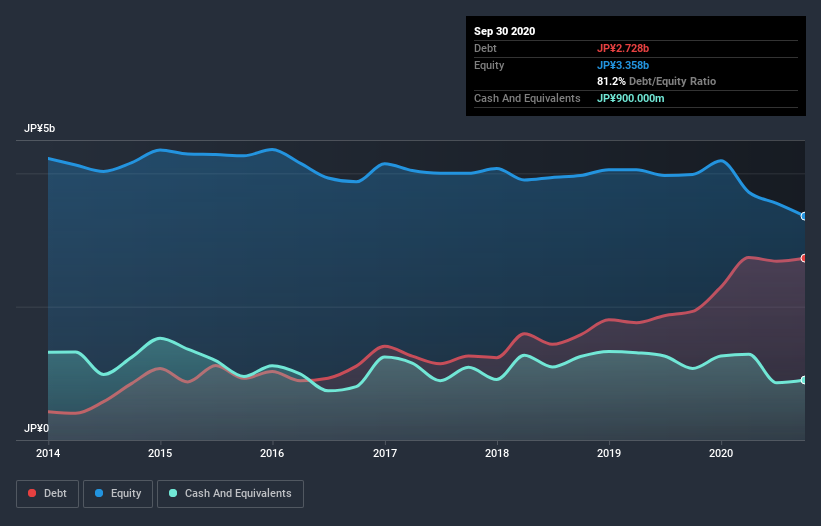
Warren Buffett famously said, 'Volatility is far from synonymous with risk.' It's only natural to consider a company's balance sheet when you examine how risky it is, since debt is often involved when a business collapses. We note that Wakou Shokuhin Co., Ltd. (TYO:2813) does have debt on its balance sheet. But should shareholders be worried about its use of debt?
What Risk Does Debt Bring?
Debt assists a business until the business has trouble paying it off, either with new capital or with free cash flow. If things get really bad, the lenders can take control of the business. While that is not too common, we often do see indebted companies permanently diluting shareholders because lenders force them to raise capital at a distressed price. By replacing dilution, though, debt can be an extremely good tool for businesses that need capital to invest in growth at high rates of return. The first thing to do when considering how much debt a business uses is to look at its cash and debt together.
View our latest analysis for Wakou Shokuhin
What Is Wakou Shokuhin's Debt?
As you can see below, at the end of September 2020, Wakou Shokuhin had JP¥2.62b of debt, up from JP¥1.93b a year ago. Click the image for more detail. However, it does have JP¥900.0m in cash offsetting this, leading to net debt of about JP¥1.72b.

How Healthy Is Wakou Shokuhin's Balance Sheet?
Zooming in on the latest balance sheet data, we can see that Wakou Shokuhin had liabilities of JP¥2.97b due within 12 months and liabilities of JP¥1.78b due beyond that. Offsetting this, it had JP¥900.0m in cash and JP¥1.65b in receivables that were due within 12 months. So its liabilities outweigh the sum of its cash and (near-term) receivables by JP¥2.20b.
Given this deficit is actually higher than the company's market capitalization of JP¥2.10b, we think shareholders really should watch Wakou Shokuhin's debt levels, like a parent watching their child ride a bike for the first time. In the scenario where the company had to clean up its balance sheet quickly, it seems likely shareholders would suffer extensive dilution. When analysing debt levels, the balance sheet is the obvious place to start. But you can't view debt in total isolation; since Wakou Shokuhin will need earnings to service that debt. So if you're keen to discover more about its earnings, it might be worth checking out this graph of its long term earnings trend.
In the last year Wakou Shokuhin had a loss before interest and tax, and actually shrunk its revenue by 4.3%, to JP¥10b. We would much prefer see growth.
Caveat Emptor
Over the last twelve months Wakou Shokuhin produced an earnings before interest and tax (EBIT) loss. Indeed, it lost JP¥171m at the EBIT level. Considering that alongside the liabilities mentioned above make us nervous about the company. We'd want to see some strong near-term improvements before getting too interested in the stock. Not least because it had negative free cash flow of JP¥839m over the last twelve months. So suffice it to say we consider the stock to be risky. The balance sheet is clearly the area to focus on when you are analysing debt. However, not all investment risk resides within the balance sheet - far from it. For instance, we've identified 3 warning signs for Wakou Shokuhin (1 is significant) you should be aware of.
If, after all that, you're more interested in a fast growing company with a rock-solid balance sheet, then check out our list of net cash growth stocks without delay.
If you decide to trade Wakou Shokuhin, use the lowest-cost* platform that is rated #1 Overall by Barron’s, Interactive Brokers. Trade stocks, options, futures, forex, bonds and funds on 135 markets, all from a single integrated account. Promoted
Valuation is complex, but we're here to simplify it.
Discover if Wakou Shokuhin might be undervalued or overvalued with our detailed analysis, featuring fair value estimates, potential risks, dividends, insider trades, and its financial condition.
Access Free AnalysisThis article by Simply Wall St is general in nature. It does not constitute a recommendation to buy or sell any stock, and does not take account of your objectives, or your financial situation. We aim to bring you long-term focused analysis driven by fundamental data. Note that our analysis may not factor in the latest price-sensitive company announcements or qualitative material. Simply Wall St has no position in any stocks mentioned.
*Interactive Brokers Rated Lowest Cost Broker by StockBrokers.com Annual Online Review 2020
Have feedback on this article? Concerned about the content? Get in touch with us directly. Alternatively, email editorial-team@simplywallst.com.
About TSE:2813
Wakou Shokuhin
Manufactures and sells soups and natural extracts in Japan and internationally.
Flawless balance sheet and good value.
Market Insights
Community Narratives




